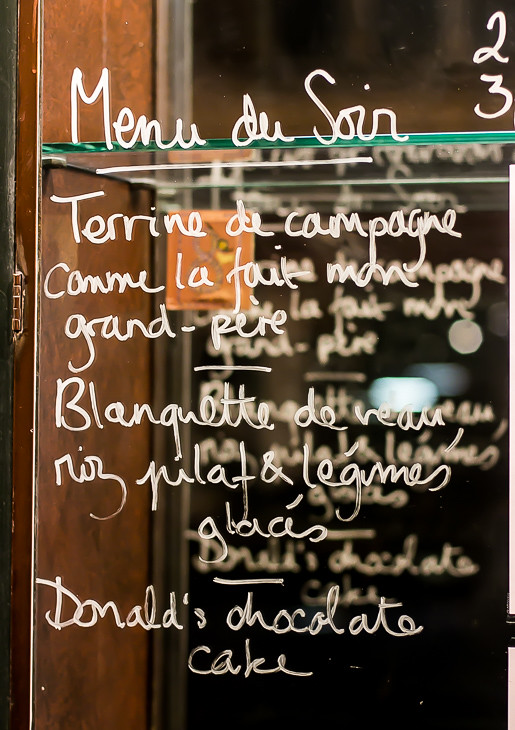Posted: 03 Nov 2014 - David Lebovitz
My interest was piqued the other day
when I was reading a popular user-generated review site, and came across a
review for a restaurant in Paris. The author said they could tell they were in
a good place because when they walked in, nobody was speaking English. In an
international city like Paris, I don’t mean to be Déborah Downer (pronounced
dow-nair), but a
lot of people in Paris speak English. And I find it curious that tourists don’t
want to go to a restaurant where there are other tourists. (Good thing they
don’t feel that way about hotels – I doubt there’s be any place to sleep!) It’s
as if the presence of foreigners equals bad food.
I, for example, am often a tourist
and I love eating well when I travel. I hope the presence of me and my friends
dining in a restaurant, say, in Palermo or Vancouver, don’t portend to
potential diners poking their heads in, that a restaurant sucks.
Restaurants in Paris often offer
menus in English for a couple of reasons. One is that it makes the servers
lives easier as the servers (who often has their hands full), don’t have to
stand there and translate a menu for each and every diner. (You’ll notice
dining rooms in most small restaurants in Paris don’t have busboys, runners,
hosts, etc. The servers do it all.) And other reason is that it’s easier for
the diners, too.
 And for his or her host as well.
Such as in my case, since I often translate menus when dining with out-of-town
guests and friends who don’t read French. While I’m happy to run through the
menu the first time for everyone, no one seems to pay attention. Then I have to
go back and explain things item-by-item again. (And people always want to know
things like, “If it says poulet
fermier, what piece of chicken will I get?” or, “Is there going to
be a sauce on that?”) And by the time I’ve read it all through for someone, I
need a glass of wine — which at this point, is a priority.
And for his or her host as well.
Such as in my case, since I often translate menus when dining with out-of-town
guests and friends who don’t read French. While I’m happy to run through the
menu the first time for everyone, no one seems to pay attention. Then I have to
go back and explain things item-by-item again. (And people always want to know
things like, “If it says poulet
fermier, what piece of chicken will I get?” or, “Is there going to
be a sauce on that?”) And by the time I’ve read it all through for someone, I
need a glass of wine — which at this point, is a priority.
No comments:
Post a Comment